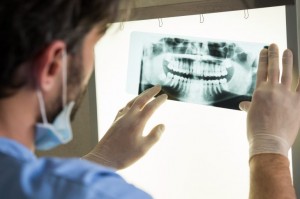California Lawmakers Aim To Pay Dentists More To Treat Poor Patients
By Ana B. Ibarra
 Lawmakers have introduced a bill aiming to improve Denti-Cal, the state’s dental program for the poor — a program that was subject to a scathing independent audit earlier this year.
Lawmakers have introduced a bill aiming to improve Denti-Cal, the state’s dental program for the poor — a program that was subject to a scathing independent audit earlier this year.
The proposed legislation, mostly sponsored by Republicans, is among the first public bids for revenue from the statewide tobacco tax that voters approved in November.
The bill, introduced by Assemblyman Brian Maienschein, R-San Diego, would require the Department of Health Care Services, which oversees Denti-Cal, to boost pay for participating dentists. California’s reimbursements for these dentists have long been among the lowest in the nation, and they have not changed since 2001.
California providers receive about a third of what their colleagues in other states get when treating Medicaid-eligible patients, according to an April report by the state’s Little Hoover Commission, an independent oversight agency.
As a result, the shortage of dentists willing to take Denti-Cal has contributed to an “epidemic of tooth disease in which toddlers by the thousands have mouthfuls of cavities,” the report says. Denti-Cal, part of California’s Medi-Cal program, serves half of California’s children and about a third of adults.
The bill would increase reimbursements for the 15 most common services for prevention and treatment, such as teeth cleaning and cavity filling. Rates would be increased to average commercial rates and would take effect in 2018.
The bill itself does not detail where additional funding for Denti-Cal would come from. But in a letter to Gov. Jerry Brown, Senate and Assembly Republican leaders said funding should come from proceeds of Prop. 56, the new statewide tax raising the price of a pack of cigarettes by $2.
The new tax “specifically provides new funding to address the shortage of dentists, prevent and treat dental diseases, and improve existing programs to provide quality healthcare and access to healthcare services for families and children,” wrote Assembly Republican Leader Chad Mayes, R-Yucca Valley, and Senate Republican Leader Jean Fuller, R-Bakersfield.
One Democratic lawmaker, Sen. Toni Atkins, D-San Diego, is among the bill’s cosponsors.
The letter notes that the Legislative Analyst’s Office estimated the tobacco tax would bring in about $1 billion in revenue to the state. “These funds are clearly available to fix Denti-Cal,” the leaders wrote.
The state’s Department of Health Care Services declined comment on pending legislation.
According to the bill, the goal is to attract and keep more providers in the Denti-Cal program, which serves 13 million Californians. Low reimbursement rates have been noted as a big reason for the short supply of Denti-Cal providers across the state.
For instance, the Denti-Cal reimbursement payment to California dentists for an oral exam is about $15. This compares to the national average of $45.61 for the same exam, according to 2015 state data.
A 2014 report by the California State Auditor found that only about 44 percent of children enrolled in Denti-Cal had seen a dentist in the previous year. The review also found that there were no Denti-Cal providers in five counties and in 11 other counties Denti-Cal providers were not accepting new patients.
Dentists who do take Denti-Cal patients are often inundated.
Dr. Santosh Sundaresan, the chair of community dental programs at the Herman Ostrow School of Dentistry at USC, said the prospect of higher pay is good news for both dentists and patients. When Denti-Cal providers have to see as many as 40 patients a day to sustain their business, at some point quality is compromised, he said.
“Increased rates make it more realistic for dentists to take care of the general population,” Sundaresan said. “I would like to see the scope of services [covered by Denti-Cal] expand, too. But one step at a time.”
Dr. Naina Bhoot, a dentist in Glendale, Calif., says the gaping need for dental services keeps her from cutting ties with the state program.
About half of her patients are covered through Denti-Cal. Her reimbursement for services rendered to these patients is about 25 percent of her usual service fee for patients with other coverage, she says.
Bhoot, who has been practicing for 27 years, said she has formed bonds with many of her patients, but she also needs an incentive and some reassurance that she can keep her practice afloat.
News that legislators are looking into the issue, she said, gives her some hope.













